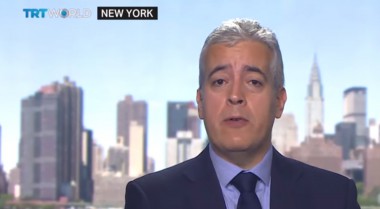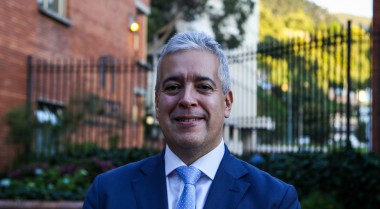GPPAC Director's Vision: The Road Ahead
Eleven years ago, civil society leaders from around the world had a vision: they would launch a global movement to create a paradigm shift in the way the international community addressed armed conflict. A shift from reaction to prevention.
This vision was articulated in the creation of the Global Partnership for the Prevention of Armed Conflict, GPPAC. A civil society led international organisation that would act as a convener of multiple actors to think together, plan together and act together at the national, regional and global levels, to prevent the escalation and the relapse of violent conflicts.
Today there is no policy discussion on peace and security that does not put the issue of prevention at its heart. When asked about his priorities, the new Secretary General of the United Nations António Guterres mentioned three words: prevention, prevention, prevention.
Mr. Guterres is not alone in emphasising the importance of prevention. There seems to be a broad consensus about this in policy circles. However, when asked the question about how to do prevention the answer is not so evident.
How can preventive actions be articulated? Who should do prevention? Who should lead prevention efforts? How can the different actors of prevention work together?
If we are going to be serious about prevention we should be clear about one thing: any effort to do prevention should put people's concerns, fears and perspectives at the centre. Prevention policies and actions will only work if they respond, not only to the security needs of states (national security), but especially to the needs of individuals and communities. People need to be empowered as active agents of their own security.
Towards a new multilateralism
Managing collective risks from the perspective of both states' and people's interests requires a new type of multilateralism—more inclusive, flexible, innovative and able to provide creative responses to increasingly complex challenges.
GPPAC is bound to be a leader of this new approach to multilateralism. We are in a unique position to bring the voices of grassroots actors to regional and global multilateral forums and make a significant contribution to managing the risk of violence outbreaks.
Our network has made important contributions at the level of the UN where we are now approached by different agencies as a valuable civil society contra part. A good example of this is the establishment of the Civil Society-UN Prevention Platform (which is co-facilitated by GPPAC, the Quaker's UN Office –QUNO- and the UN Department of Political Affairs). This initiative seeks to identify concrete, practical steps to enhance the UN and civil society organisations' (CSOs) collective capacity to carry out preventive work, through sharing examples of best practices, identifying areas of potential collaboration on thematic issues and country cases, and supporting UN efforts to bridge early warning and early action.
Other examples of GPPAC's leadership in this new multilateralism, is the strong convening power that our network has shown. This has enabled us to create spaces of dialogue and collaboration with a number of high profile political actors from regional organizations, the UN, national governments and CSOs (as could be seen during the two high level conferences on collaboration between Regional Organisations and Civil Society), to think together about how to enhance our collaboration and be more effective at prevention efforts. GPPAC has also become a reference in issues such as human security, track two dialogue processes and the women, peace and security agenda, among others.
CSOs have an important role to play in an expanded conception of multilateralism. GPPAC is well positioned to play a leading role in this process. We will continue with our work to open up new spaces for dialogue and collaboration with global and regional multilateral organisations and be more effective in managing collective peace and security risks.
The way forward
As we move into a new stage in the development of GPPAC there are three areas to which we need to put special attention: 1) the strengthening and expansion of the network; 2) the network's ability to use the accumulated knowledge and expertise to position itself as a relevant actor to influence national, regional and global political processes; 3) the long term sustainability of GPPAC and its ability to formulate innovative responses to today's challenges. These three elements are mutually reinforcing and need to be tackled simultaneously.
The heart of GPPAC is the global network and we need to keep it healthy. We need to reinvigorate the initial drive and energy that came with the establishment of our network eleven years ago. Since its creation, GPPAC has occupied significant spaces at the global and regional level. It is now time to bring GPPAC closer to the national level and make it an even more useful tool by articulating strong networks in key countries where our work is most needed. By doing so, we will not only make GPPAC more relevant to our members in their specific contexts, but we will also open up spaces for organisations that have not been able to fit adequately in the current structures. This will strengthen our constituency and make us better able to connect the different levels of action to make preventive efforts more effective.
Generating, consolidating, using and disseminating our expertise is the second leg on which our network needs to stand. We need to become better at capturing the incredible amounts of knowledge and expertise available and package it in a way that can be easily communicated and acted upon. On one hand, this means enhancing our efforts to generate knowledge products and actionable recommendations based on the practice of our members. On the other hand, this also means increasing our presence in the media in different countries, not only to communicate our views and enhance our visibility but to be more effective in our efforts to influence policies and improve practice.
A strong, credible network, able to communicate its expertise, develop good practices and be savvy at leveraging its political influence should also be effective at attracting the attention of funders. While the funding environment has become increasingly challenging, our work is probably more needed now than ever. We need to move into a more innovative and ‘entrepreneurial' mentality. GPPAC should become a hub for innovation, providing sharp analysis and ideas to enable collaborations with different actors to formulate creative responses to today's complex political problems.
There are challenging times ahead of us. GPPAC was founded on principles such as just peace, participation, diversity, inclusiveness, cooperation, transparency and equality. Now more than ever we need to be loud about the values that unite us and articulate an alternative to the narrative of fear, isolation and despair. Let's keep working together. Let's stand to the challenge and make our vision of a more peaceful, just, secure and prosperous world a reality.

